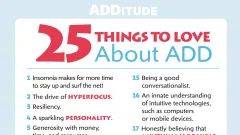“Women with ADHD Prefer Silence Over Disclosure. This Needs to Change.”
More than half of adults with ADHD prefer to keep their diagnosis to themselves, according to a recent Understood.org survey of 2,100 adults conducted online by The Harris Poll.
However, an even more concerning pattern emerges when we break down the results by gender: 66% of young women (ages 18–34) prefer to stay silent compared to 42% of young men with ADHD.In part, the survey results suggest that women with ADHD are perceived differently than are men with ADHD — a finding that more than half of survey respondents (three-quarters of whom were women) agree to be true.We know that self-stigma is a key barrier to seeking professional support. (Footnote 1) While the survey’s findings relate to ADHD specifically, they speak to a larger societal phenomenon: Individuals internalize public stigma, e.g., stereotypes, prejudice, and discriminatory attitudes endorsed by the public.
We see examples of internalized public sigma across women’s mental and general health, including their ADHD diagnosis.Although men and women are just as likely to have learning and thinking differences, girls with ADHD are diagnosed as often as boys. (Footnote 2) Many women receive their ADHD diagnoses in their 30s, 40s, and beyond.
When a woman is diagnosed with ADHD later in life, she’s likely spent decades struggling without understanding why. A late-in-life diagnosis may be the route of frustration, self-doubt, and anxiety.Researchers have primarily based assessment tools on studies of boys and they do not norm for female populations.
Read more on additudemag.com




















































